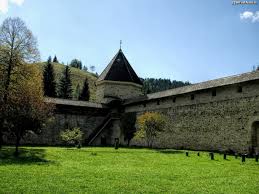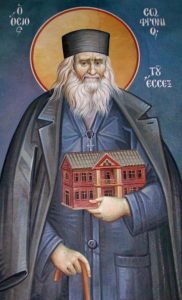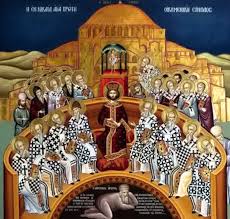Elder Sophrony
The legacy left to us by the Holy Fathers comprises recommendations about the ways of knowing God, namely about that fight they fought in their inner world against the law of sin [1] which is alive within everyone of us – this tragic consequence of the first and great fall of man.
Who enters in the arena of the complex fight for acquiring it, has to stand against the corrupt leaven of the world surrounding us, that has an aversion for prayer. And the best defence for this is: Lord Jesus Christ have mercy on us and on Your world.
The name of Jesus Christ is for the believer like a high defence wall. It is not easy for the enemy to cross its gates with his guile if our heed is not distracted by what is outside.
The Jesus prayer gives power to the soul not only to stand against the harmful attacks from the outside but even more than that to influence the environment where he lives: to come a bit out of the bottom of his soul and communicate with his brothers peacefully and lovingly.
Peace and love commanded by God if multiplied become an ardent prayer for the whole world. Christ’s spirit takes us out to the endless spaces of love that embraces the entire creation. Being in this state, the soul prays with a great intensity:
Lord Jesus Christ have mercy on us and on Your world.
God never forces man’s will nor can He be forced by someone with anything. In our prayer we strive to present ourselves in the unity and totality of our being, first in the unity of our mind then of our heart. But for reaching this blissful union of the two main powers of our personality, we do not use any artificial (psycho artificial) means.
First we force our mind to focus attentively on prayer, as our holy fathers teach us, meaning to utter intently Jesus Christ’s name and all the other words of the prayer.
The invocation of the name of the Lord, followed by the daily strife of living in accordance with the commandments of the Gospel has as result the unification of the mind with the heart in a natural and unitary work. We must never rush in our ascetic strife. But it is absolutely necessary to leave away the thought which urges us to acquire the maximum result in a very short period of time.
The centennial experience showed that the unification (of the mind with the heart) acquired by psycho artificial means does not last long. And what is the most important is that it does not lead to the unification of our spirit with the spirit of the Living God.
The question of our eternal salvation arises before us in its deepest meaning.
For this it is required ti renew our entire nature: the bodily nature should turn into a spiritual one. When God considesrs us worthy to receive His grace, then He shall not delay to come as an answer to our humble request. His coming sometimes absorbs us so much that our heart and mind are entirely and exclusively engrossed in Him. And this seen world leaves its place to the reality of the other world, of a higher order.
The mind stops being scattered; it becomes entirely prayer. Our heart reaches an indescribable condition. It is full of fear, but it is a holy, life giving fear. Then the man breathes diffidently: he sees how he is inside and outside; he fills everything and he lives entirely only for God (with his spirit-mind, heart-feelings and even with his body)
Lord Jesus Christ have mercy on us and on Your world.
Source: Archimandrite Sophrony Saharov, About prayer,
Holy Monastery Saint John the Baptist, Essex, England 1993, pp.168-169.
[1] Romans 7, 23.







